Questions Asked, Answers Given at HCHD Meeting
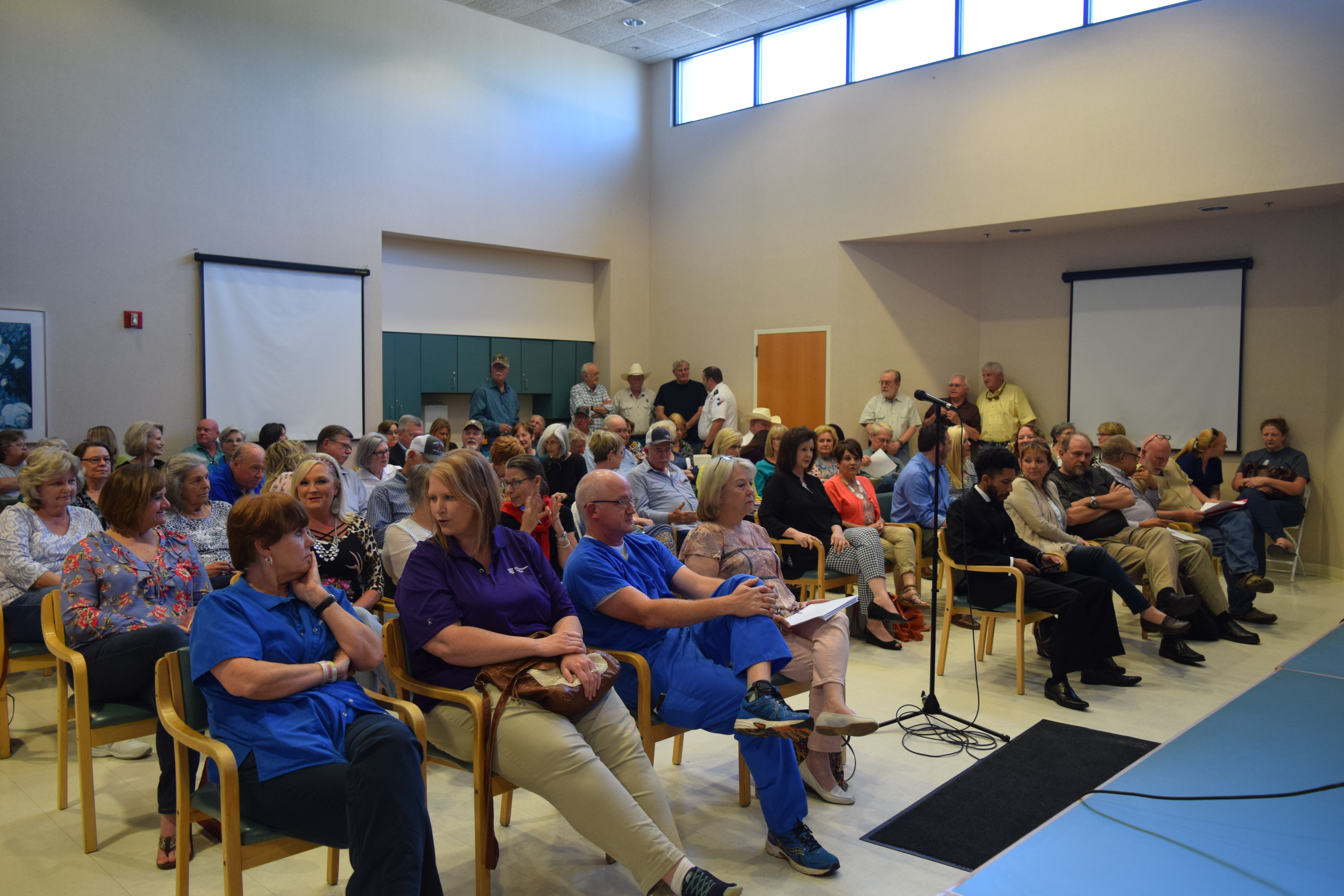
Aug. 1 Given as Target Date for Re-opening of Hospital
By Will Johnson
Messenger Reporter
HOUSTON COUNTY – As the regular meeting of the Houston County Hospital District Board of Directors meeting was convened, the directors were greeted by a standing room only crowd in the hospital facility’s cafeteria.
Board President Deborah Porth Blackwell called the meeting to order at 5:30 p.m. and asked Rev. Albert Moses III to provide the invocation.
Once the invocation concluded, Blackwell introduced Dr. Kelly Tjelemand and Dr. Subir Chhikara – the principal owners (along with a third silent partner) of Crockett Medical Center, formerly Timberlands Healthcare.
Dr. Tjelemand spoke first and said while things might seem a little quiet on the hospital front “… I can assure you, things on our end have been extremely busy. We have made really good progress and we just wanted to go through where we stand.”
After Tjelemand provided a brief background of his medical training and current practice, he turned the floor over to Dr. Chhikara.
“I grew up in Houston, not too far from here,” the physician said. “I went to A&M and we (he and Tjelemand) still get along pretty well.” Tjelemand is a graduate of UT.
The two met at medical school at Baylor University and after several years, re-connected in Austin, where Chhikara is an urologist and Tjelemand is a reconstructive surgeon.
“We are excited to be here and be a part of the community now. I’d like to start by saying the hospital is opening,” he said as he was drowned out by applause from the audience.
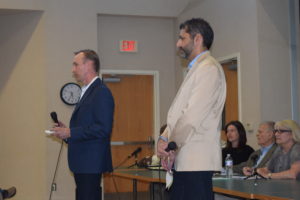
Tjelemand reported he was aware of questions concerning why the hospital would work this time, given its recent history of struggles.
“One of the things we are going to do is run a very efficient operation. Also, a critical designation is that we will achieve a critical access designation from Medicare and CMS (Centers for Medicare and Medicaid),” he said.
He explained the difficulties of opening a hospital and said achieving critical access status was doubly hard, because it was similar to opening a hospital twice.
“Why a critical access designation is so important is that it allows us to be reimbursed based on what it costs to deliver the care. It is completely different payment model than most hospitals typically get and it’s reserved for rural areas,” Tjelemand explained. The reimbursement rate is 101 percent of the cost.
He added the closure of the Trinity hospital allowed Crockett Medical Center to apply for critical access.
“We are trying to get a critical access designation and an acute care designation through the CMS process. So, we are running two simultaneous application processes through the government,” he said.
Chhikara added this is not the normal course of events “… and I think for this community, this is the way it has to be done to insure the viability of this hospital. With Congressman (Kevin) Brady coming down and helping us at the national level, we were able to make progress with this whole idea of two applications coming together.”
After Tjelemand thanked former Congressman Jim Turner and State Representative Trent Ashby for their assistance, he said the application process is far enough along “… the hospital is going to happen and it will open. At this point we are looking at a target date for the hospital as Aug. 1. We think we can hit that target as things are becoming clearer to us.”
As the two doctors continued, they discussed the services they hoped to provide. First and foremost, Tjelemand said the hospital need to have a fully operational emergency room.
The two doctors expressed their desire to have primary care and significantly enhanced pediatric care. A very important feature for the community, Tjelemand added, was to have a fully functioning lab, along with a fully functioning radiology department to include X-rays, CAT/PET scans and MRIs. Tjelemand furthered both he and Chhikara hoped to have these ready to go on day one.
“From there, we hope to add further specialty services. I can’t comment on those right now because the negotiations are ongoing,” he said.
Chhikara picked up where Tjelemand left off and said he hoped to make a smooth transition from the current CHRISTUS clinic to the CMC clinic in June.
“We already have our CMS Medicare number for the clinic. We have also reached out to all the local contractors and insurance agents. Applications are in and we also have our Medicaid application in. The clinic is also on target. We also want to make sure the electronic medical records portion is in place,” Chhikara said.
“We feel confident the clinic is going to open and there will be no lapse in coverage in Houston County (once CHRISTUS shuts down),” he added.
Next, the doctors introduced Jeff Perry as the CEO of the new hospital. Perry had previously worked for Little River / Timberlands, but fell victim to the unexpected closure.
Perry said he planned to begin posting jobs within the next two weeks by using Facebook and the local news media.
“Our best estimate as to what we will bring on? About 45 jobs initially and we will expand from there,” he said. “With the employee hiring, once they apply, we will do an interview process and hopefully select the best candidates for these roles. We will be top-notch on our customer service – like never before.”
Following a few more minutes of discussion, the HCHD board went into the business end of the meeting.
Among the items approved were:
- The minutes from the March 20 meeting.
- The district financial report.
- A resolution to conduct a joint election with Lovelady ISD.
The medical office building and residential housing lease, along with the indigent care agreement were tabled for further discussion.
At the conclusion of the business part of the meeting, Blackwell opened the floor for comments and questions.
The first comment came from former County Judge Erin Ford. He questioned the board about the proposed tax cap election and asked if the board could be more transparent with what they planned on doing with the revenue generated from a possible five cent tax hike. He also questioned if there was any way to restructure the HCHD’s debt.
Rhonda Brown spoke next and asked what happened to the relationship between CHRISTUS and CMC.
Tjelemand replied the CHRISTUS departure had always been a part of the plan – as far as CHRISTUS transitioning out and CMC transitioning in. Chhikara added even after the transition between the two clinics was complete, the plan to work with CHRISTUS by using the CHRISTUS specialists.
The next person to speak was Virginia Lewis. Lewis said she wanted to know why the board didn’t stay with CHRISTUS.
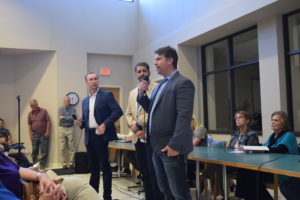
“Their proposal was to have an urgent care center and that was it,” Blackwell replied.
As the public forum continued, board member Kathi Calvert spoke up about the ongoing saga of rural healthcare in America.
“I have heard a lot of questions about who theses doctors are? We don’t know them. Where are the big names? Where is CHI? Where is ETMC? Where is CHRISTUS? What you are seeing is the picture of rural health (care) in America,” she said.
“It is a commodity,” she continued. “It is a profit center and we are not profitable enough to stand alone. They (hospital organizations) want us as a feeder. They don’t want the ER, they don’t want X-rays and they don’t want MRIs. They want to send us to Tyler or to Houston or to their larger facilities where they can make more of a margin. These doctors are risking their own personal reputations and their own personal wealth for our county.”
Before she concluded her remarks, Calvert added, “That is where we are. We are not profitable enough. We do not bring enough to the table. That’s the reality at this point.”
Following Calvert, one Houston County resident questioned the board’s honesty. He said before ETMC left, the district had $3 million in the bank but was now $8 million in debt.
“You had an election last fall to raise the cap to 75 cents and now you’re trying to go to 35. You say you want this cap at 35 but you’re not going to go that high. Do you expect us to believe that? I don’t,” he said.
Nurse Practitioner Natalie Bachynsky also addressed the board and the audience. She said that she currently worked with CHRISTUS and the impression she got was “… CHRISTUS didn’t want this hospital. We are here to do the best we can and they (the HCHD board) are doing the best they can.”
Bachynsky added one of the drawbacks to the current state of the hospital was the lack of private insurance and too much reliance on Medicare and Medicaid payments from the federal government.
Other areas addressed included the air/ground ambulance service. The audience was assured the services were not leaving or going anywhere.
As the meeting neared its conclusion, a question was asked about how long the doctors were willing to stay if things didn’t go as smoothly as hoped for.
“As long as it takes,” Tjelemand replied.
According to the CMC Facebook page, “The CMC objectives are to ensure Houston County and surrounding areas have high quality and customer service oriented healthcare within the community. In turn, this will also bring jobs and other economic benefits to the community.”
Will Johnson may be contacted via e-mail at [email protected]

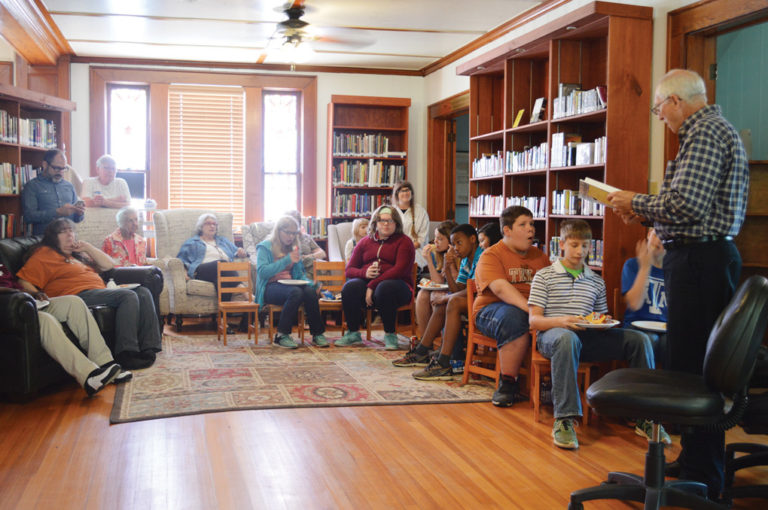


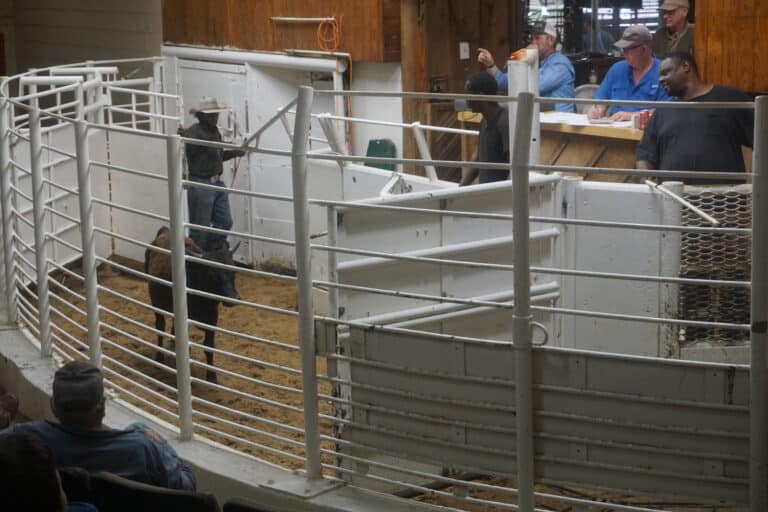

5